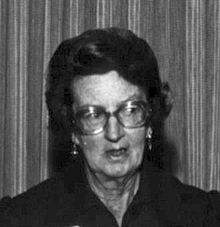Mary Leakey
| Mary Leakey | |
|---|---|

Leakey in 1977
|
|
| Born | Mary Douglas Nicol 6 February 1913 London, England, United Kingdom |
| Died | 9 December 1996 (aged 83) Nairobi, Kenya |
| Nationality | British |
| Fields | Paleoanthropology |
| Known for | Zinjanthropus fossil; Laetoli footprints |
| Notable awards |
Hubbard Medal (1962) Prestwich Medal (1969) |
| Spouse | Louis Leakey |
| Children | Jonathan Leakey, Richard Leakey, Philip Leakey |
Mary Leakey (6 February 1913 – 9 December 1996) was a British paleoanthropologist who discovered the first fossilised Proconsul skull, an extinct ape which is now believed to be ancestral to humans. She also discovered the robust Zinjanthropus skull at Olduvai Gorge in Tanzania, eastern Africa. For much of her career she worked with her husband, Louis Leakey, at Olduvai Gorge, where they uncovered fossils of ancient hominines and the earliest hominins, as well as the stone tools produced by the latter group. Mary Leakey developed a system for classifying the stone tools found at Olduvai. She discovered the Laetoli footprints, and at the Laetoli site she discovered hominin fossils that were more than 3.75 million years old.
During her career, Leakey discovered fifteen new species of animal. She also brought about the naming of a new genus.
In 1972, after the death of her husband, Leakey became director of excavations at Olduvai. She maintained the Leakey family tradition of palaeoanthropology by training her son, Richard, in the field.
Mary Leakey was born Mary Douglas Nicol on 6 February 1913, in London, England to Erskine Edward Nicol and Cecilia Marion (Frere) Nicol. The Nicol family moved to numerous locations in the United States, Italy, and Egypt where Erskine painted watercolors that he brought back and sold in England. Mary began to developed an enthusiasm for Egyptology during these travels.
On her mother's side, Mary was a direct descendant of antiquarian John Frere and was a cousin to archaeologist Sheppard Frere. The Frere family had been active abolitionists in the British colonial empire during the 19th century and established several communities for freed slaves. Three of these communities were still in existence when Leakey published her 1984 autobiography: Freretown, Kenya; Freretown, South Africa; and Freretown, India.
...
Wikipedia
